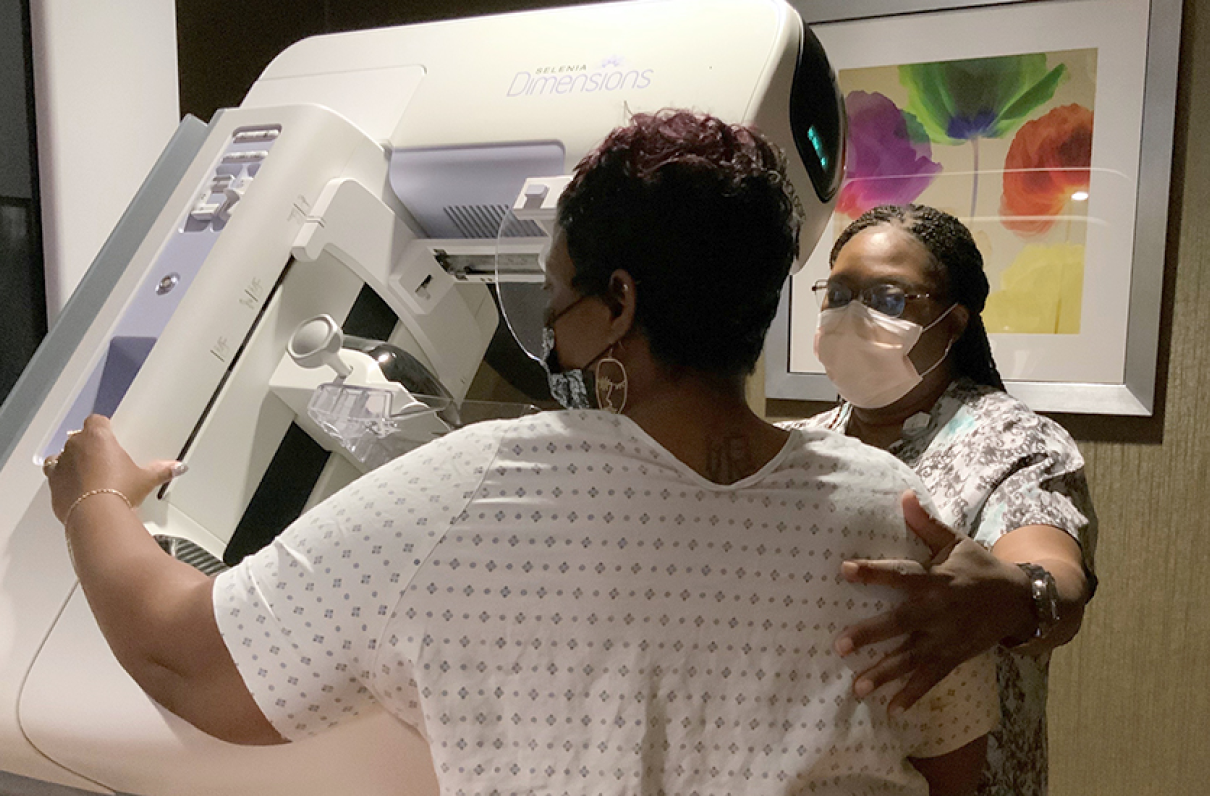Cancer can be a devastating diagnosis, no matter the patient’s age. Such a diagnosis can be especially difficult when a veteran struggles to prove the disease is service-connected, or when there are health complications because the cancer has gone undetected over time.
Congress recognized the need to provide veterans, women and men, with the necessary preventative services to address breast cancer in the ranks by passing the Making Advances in Mammography and Medical Options (MAMMO) for Veterans Act. On June 7, President Joe Biden signed the measure into law along with eight other bills that will honor and improve care for veterans.
[RELATED: Big Step for Bill Increasing Veterans’ Access to Breast Cancer Screening]
“The MAMMO Act goes a long way in providing the necessary structure and oversight for improving and modernizing breast imagining services across VA’s health care systems,” MOAA President and CEO Lt. Gen. Dan T. Atkins, USAF (Ret), said. “MOAA is especially pleased to see attention given to addressing veterans’ needs in rural communities and/or states where VA does not have breast imaging services or where cancer treatment resources are limited. The bill signing is an exciting revelation that provides an important tool to all veterans in the fight against breast cancer.”
Mammograms are one of the most important tools used to attack breast cancer — a tool used not only to diagnose and evaluate patients, but also to track patients who have had breast cancer.
This bipartisan legislation expands veteran’s access to high-quality breast cancer screenings and lifesaving cancer care. Introduced in both the House and Senate last year, sponsors included Sen. Jon Tester (D-Mont.), chair of the Senate Committee on Veterans’ Affairs, along with fellow Democratic Sens. Mazie Hirono of Hawaii, Chris Coons of Delaware, and Debbie Stabenow of Michigan, and Republican Sens. John Boozman of Arkansas and Susan Collins of Maine. Reps. Julia Brownley (D-Calif.) and Mariannette Miller-Meeks (R-Iowa) sponsored the House version.
This bill will:
- Launch a pilot program providing telemammography to veterans in states where the department doesn’t offer mammograms or where access to the tests is limited.
- Upgrade VA breast imaging facilities to use digital breast tomosynthesis – better known as 3-D breast imaging – within two years.
- Compile a series of reports and studies on multiple topics, including the feasibility of studying genetic testing for the breast cancer gene among veterans, access to mammography services for paralyzed and disabled veterans, and an overall report on veterans’ access to, and quality of, VA mammography screenings.
MOAA worked alongside other veterans service organizations and House and Senate leadership to make the MAMMO Act the law of the land.
The SERVICE Act
During the same White House signing ceremony, the president also signed the Dr. Kate Hendricks Thomas Supporting Expanded Review for Veterans in Combat Environments Act (also known as the Dr. Kate Hendricks Thomas SERVICE Act).
The bill’s namesake, Dr. Kate Hendricks Thomas, a Marine veteran who served in Iraq, was exposed to multiple burn pits in the Anbar province region when she was just 25 years old. During a routine health care appointment at her local VA medical center, her doctor advised her to get a mammogram. The mammogram revealed Thomas had an aggressive form of breast cancer at age 38. From that point until her death this year at age 42, she fought to prove her cancer was related to her exposure to toxic burn pits.
Boozman, who also sponsored this bill, told Stars and Stripes in a June 8 interview that he was “pleased to work in a bipartisan way to get these measures across the finish line so we can save lives through modern approaches to breast cancer screening and treatment as well as increased accountability within the department.”
“Our veterans deserve this progress,” the senator added, “and we must ensure these laws are implemented in a timely and effective way.”
A May 2021 breast cancer study by the National Library of Medicine mentioned in the Stars and Stripes report found women veterans were nearly three times more likely to develop invasive breast cancer than the rest of the population. The study also reported breast cancer cases had tripled in the VA from 1995-2012.
Additionally, the study said breast cancer is the leading cancer that affects women veterans, with data that implied increases were based on service-related exposures.
The Dr. Kate Hendricks Thomas SERVICE Act will expand eligibility for VA health care mammography screenings to veterans who served in certain locations during specific periods, including those who were exposed to toxic substances in the following locations:
- Iraq between Aug. 2, 1990, and Feb. 28, 1991, and from March 19, 2003, until burn pits (areas used for burning solid waste in open air without equipment) are no longer used in Iraq.
- The Southwest Asia theater of operations, including Kuwait, Saudi Arabia, Oman, and Qatar, from Aug. 2, 1990, until burn pits are no longer used in such locations.
- Afghanistan, Djibouti, Syria, Jordan, Egypt, Lebanon, and Yemen from Sept. 11, 2001, until burn pits are no longer used in such locations.
- Other locations and time periods as determined by the Airborne Hazards and Open Burn Pit Registry.
Of note, locations do not include bodies of water around or airspace above such locations.
MOAA is grateful to lawmakers and the administration for making breast cancer screening and treatment a priority in the 117th Congress.
More Members Mean More Influence Over Our Health Care
Get involved and make sure your interests are addressed. Because the larger our voice is, the greater our impact will be.

